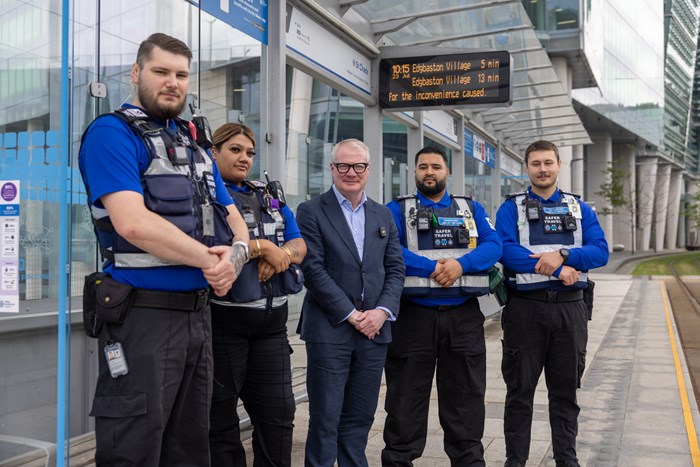Women and girls priority for three-year strategy for safer public transport
Published: Tuesday 23 Sep 2025
The ground-breaking West Midlands Safer Travel Partnership has set out new plans to use crime-busting technology and put safety of women and girls at the centre of plans for the next three years.
The award-winning Partnership, which celebrates its 20th anniversary this year, has launched a new three-year strategy which sets out to not only reduce crime and anti-social behaviour on the region’s public transport network but make sure people feel safer too.
And the message is clear that with just 2.2 crimes or anti-social behaviour reported for every 100,000 journeys, public transport in the West Midlands is safe for the vast majority of passengers.
Key new initiatives include revising design standards for key infrastructure such as bus shelters, tram stops and bus stations to prioritise safety of women and girls travelling alone.
This includes making sure areas are well lit, promoting public help-points with video links to female control room staff, as well as more training for staff on the public transport network.

Patrol team from left: - Lee Clarke, Esha Sheemar, Mayor Richard Parker, Mohammed Naqshbandi and Nikodem Szewczyk
Further to this the plan sets out how the Partnership will harness the latest technology, including AI analysis, to help identify anti-social hotspots and trends to both detect and prevent issues.
Over the last two decades the Partnership, which is made up of Transport for West Midlands (TfWM), West Midlands Police (WMP), British Transport Police (BTP) and transport operators, has won awards for its approach to public transport safety.
In recent years it has pioneered the development of Transport Safety Officers (TSOs) – dedicated to tackling low level crime and anti-social behaviour. The team is growing and officers are now assisting other parts of the country to set up their own TSO teams.
TfWM’s CCTV control room, that has access to more than 5,000 security cameras covering the tram, rail and road networks across the region, proves invaluable in identifying and catching criminals as well as keeping the region moving.
Richard Parker, the Mayor of the West Midlands recently went out on patrol with TSOs seeing how they patrol the network and keep people safe.
The Mayor said: “I want to make journeys easier, more affordable and crucially safer for everyone – especially women and girls. his new strategy shows exactly how we're working with the police and our transport partners to make that a reality."
“We know people can feel less safe at night, so we're taking action to reassure them. That means looking at how we design stations, stops, and shelters and how we deploy our transport safety officers. While incidents of crime and anti-social behaviour are rare, we have a dedicated team working around the clock to keep people safe."
A safe and accessible public transport network is crucial to delivering on the Mayor’s Growth Plan which sets out to reboot the West Midlands economy by creating 100,000 good jobs in fast-growing industries, improving public transport, and building 120,000 homes
Women rely on public transport far more than men, making 30% more trips for everything from work to family care but their journeys are often limited due to safety fears. This acts as a severe barrier, forcing women and girls to pass up on vital opportunities like employment and training. It is not just a matter of personal security; it's an economic and social crisis. These fears limit ambitions, effectively stifling their potential and holding back economic growth – at an estimated cost of up to 3.7% of GDP.
Simon Foster, West Midlands Police and Crime Commissioner, added: “Making our public transport network, safer for women and girls is a top priority. By combining better design, new technology and dedicated officers, we are tackling crime and anti-social behaviour, while ensuring passengers feel safe and confident whenever they travel.”
A survey of public transport users found that there is a huge difference in perceptions of safety between travelling during daylight hours and at night. People also felt trains were safer than trams or buses and waiting at bus stops was a leading concern.
In response to these concerns the Partnership has drawn up an action plan to improve safety. This includes:
- more community engagement, information sharing and education initiatives with the travelling public
- Better design standards for new infrastructure based on the lived experience of vulnerable passengers
- Greater use of AI to analyse vast amounts of CCTV footage and identify issues
- Commit to White Ribbon accreditation providing staff with specialist training for prevention of violence against women and girls
- Use of drones to provide additional coverage during larger operations
Inspector Ivan Merc, police manager for the West Midlands Safer Travel Partnership, welcomed the release of the strategy and it’s priority around tackling Violence and Intimidation Against Women and Girls.
He said: “The use of public transport remains an incredibly safe way to travel and alongside our flagship Project Empower, which encourages the reporting of unwanted sexual behaviour on the transport network, the release of the strategy will enable us to continue to work closely with our partners to make travel safe for all.”
Superintendent Sue Peters, British Transport Police, said: "The West Midlands Safer Travel Partnership is vital in addressing violence against women and girls on public transport in the West Midlands. By bringing together key stakeholders and partners from the region to plan joint working to tackle this, we can make the transport network safer for everyone.
“BTP will not tolerate sexual harassment and sexual offences. Tackling violence and intimidation against women and girls is a key priority for the force. We take all reports of unwanted sexual behaviour seriously and would encourage the public and passengers to save our text number 61016, so they can discreetly report incidents to us."
Further enquiries
For all other enquiries from members of the public go to our contact us page: https://www.wmca.org.uk/contact-us/